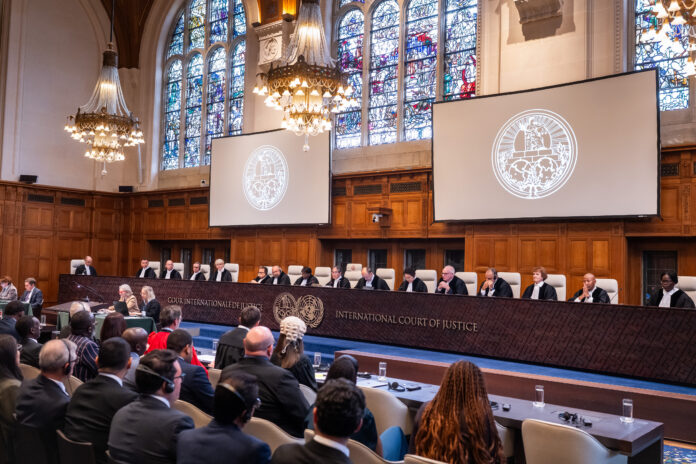On Wednesday, November 26th, the International Court of Justice (ICJ) finished public hearings on Guatemala’s request to intervene in the sovereignty dispute over the southern Sapodilla Cayes, a case currently before the Court between Belize and Honduras. The oral arguments started on Monday, November 24th, at the ICJ headquarters in The Hague, Netherlands, with legal teams from Guatemala, Belize, and Honduras presenting their arguments. The ICJ will now consider Guatemala’s request and announce a decision at a later public hearing.
Notably, Belize does not object to Guatemala’s bid to intervene. Honduras, however, strongly opposes Guatemala’s participation. The dispute before the Court began when Belize filed an application on November 16th, 2022, seeking the ICJ’s determination of the sovereignty question regarding the Sapodilla Cayes. Honduras asserts sovereignty over the Cayes, a claim rooted in its 1982 Constitution, which declares that the islands historically, geographically, and legally belong to Honduras. Guatemala also claims the Cayes, as part of its long-standing claim to more than half of Belize’s terrestrial territory, all islands, and maritime areas, a matter already before the ICJ in the Belize-Guatemala case, where oral hearings are expected in 2026.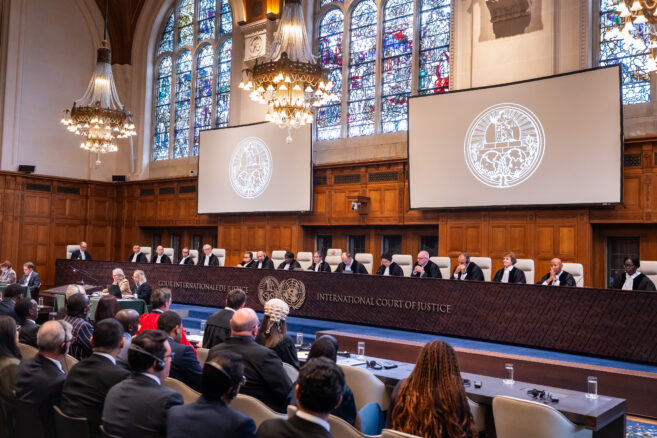
After learning that Belize had taken Honduras to court, Guatemala submitted its application to intervene on December 1st, 2023, under Article 62 of the ICJ Statute. On the first day of the hearings, Guatemala presented its arguments. Guatemala’s Agent, Ana Cristina Rodríguez Pineda, told the Court that her country’s request was necessary to protect its legal interests regarding the Sapodilla Cayes. “Guatemala’s Application is not aimed at introducing a new claim over Cayos Zapotillos (Sapodilla Cayes),” Pineda stated. She added that it would be unreasonable for Guatemala “to sit back and wait for the outcome of a case concerning a territory over which it considers itself sovereign.” She emphasized that Guatemala’s goal is to ensure its rights and interests are protected.
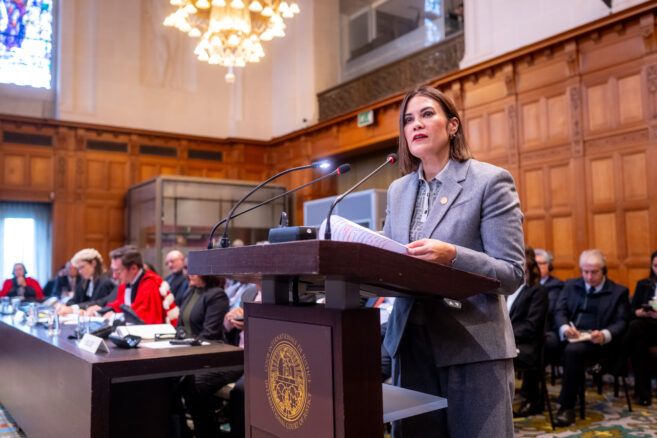
Pineda also argued that historically, only Guatemala and the United Kingdom disputed sovereignty over the Cayes between 1821 and 1981. “Before Belize’s independence in 1981, Honduras did not assert any formal claim to the continental or insular territory over which the United Kingdom had progressively established its control,” she said. According to Guatemala, Honduran claims emerged only after the signing of the 1981 Heads of Agreement involving Guatemala, the United Kingdom, and Belize.
Guatemalan counsel Rodman Bundy further argued that the Cayes are already included in the Belize-Guatemala case, and the new case involving Honduras complicates matters unnecessarily. He said Belize acted unilaterally and without consultation. Bundy noted that Honduras had relied extensively on documents from the Belize-Guatemala case in its filings and that Belize also annexed documents from that matter, demonstrating the overlap.
Second Day
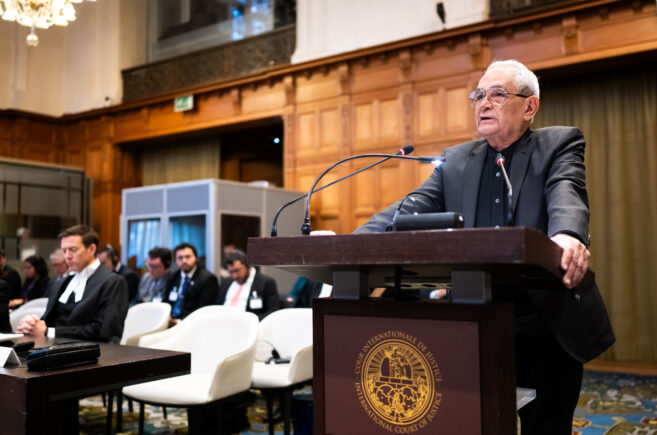
Belize presented its arguments on the second day of hearings. Belize’s Agent, His Excellency Assad Shoman, reiterated that Belize does not oppose Guatemala’s intervention. “Belize’s priority is an efficient and complete resolution of all claims against Belize’s territory by both Honduras and Guatemala,” he said. Shoman urged the Court to coordinate the two related cases, the Belize-Guatemala and Belize-Honduras matters, to avoid duplication, suggesting it would be logical to hear the Belize-Guatemala case first.
Counsel Ben Juratowitch reinforced Belize’s position, stating that although the cases overlap, they are materially different. He explained that in the dispute with Honduras, Belize’s claim to sovereignty rests not only on the United Kingdom’s pre-1821 assertions but also on the conduct of both states since Honduras’ independence.
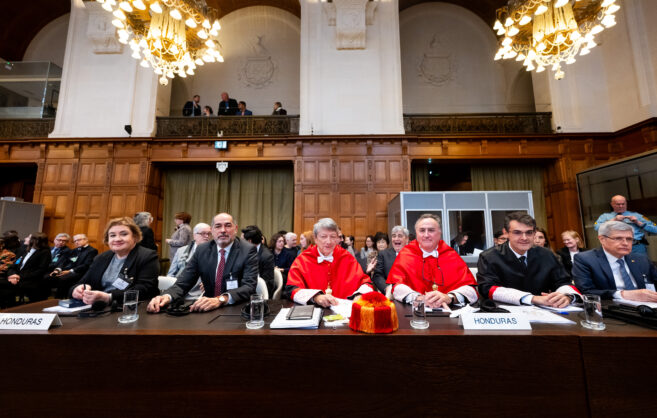
The Honduran legal team then presented its arguments, strongly opposing Guatemala’s request. Honduras Agent, Patricia Licona, asked the Court to dismiss the intervention, claiming that allowing it “would contradict the principles of sound administration of justice and due process.” Honduran counsel Alejandro del Valle Gálvez stated that Guatemala’s application went beyond the scope of a non-party intervention and misrepresented the case’s nature. Another lawyer, Carlos Jiménez Piernas, contended that Guatemala had not shown a legal interest that would be impacted by the Court’s decision.

Third Day
On the final day, Guatemala once again pressed the Court to approve its request to intervene, insisting that its long-standing claim could be affected by the outcome of the Belize-Honduras case. Sir Michael Wood, appearing for Guatemala, argued that a ruling favoring either Belize or Honduras could prejudice Guatemala’s legal interests. He stressed that Guatemala was not seeking to create a dispute with Honduras or introduce new claims but simply “to protect an interest of a legal nature – its claim to sovereignty over the Cayes.”
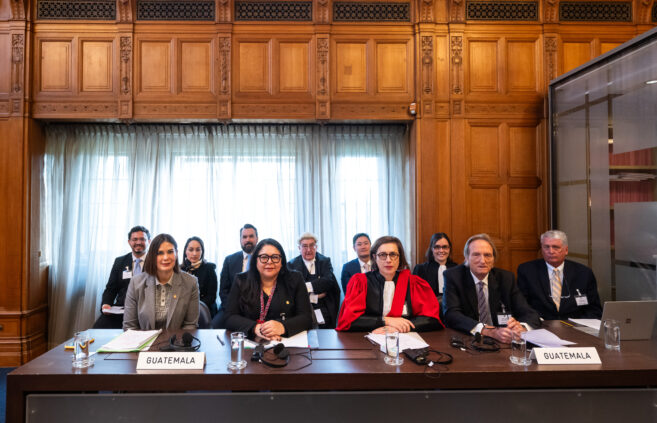
Agent Pineda closed Guatemala’s case by stating that the Court would benefit from hearing Guatemala’s perspective. “The ICJ will have a full picture of the claims of sovereignty of the three states and of the relevant documents,” she said. Pineda then read Guatemala’s formal request for intervention under Article 62.
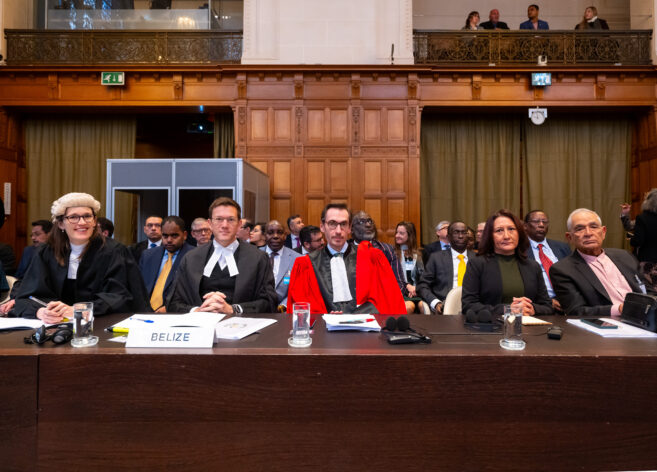
Following the conclusion of the hearings, the Government of Belize issued a press release summarizing the three-day proceedings. “Belize has submitted that the administration of justice requires that the two cases, the Guatemala v. Belize case and the Belize v. Honduras case, be coordinated, heard, and brought to full conclusion as early as possible,” the statement read. It added that it is within the Court’s discretion to decide whether Guatemala will be allowed to intervene as a non-party.
The Sapodilla Cayes, part of a marine protected area and a popular destination for visitors, especially from Guatemala, remain at the heart of a complex regional territorial dispute. While the ICJ’s ruling on Guatemala’s intervention request is still pending, the larger conflict aims to settle overlapping sovereignty claims between Belize and Honduras, with Guatemala’s involvement adding a new layer to an already sensitive geopolitical issue.

